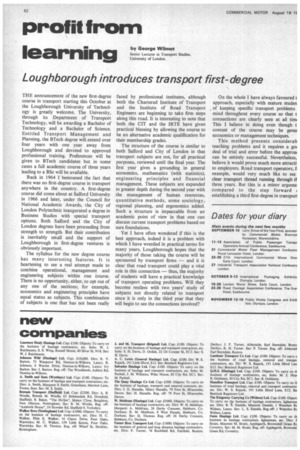profit from learning
Page 54

If you've noticed an error in this article please click here to report it so we can fix it.
by George Wilmot
Senior Lecturer in Transport Studies, University of London.
Loughborough introduces transport first-degree
THE announcement of the new first-degree course in transport starting this October at the Loughborough University of Technology is greatly welcome. The University, through its Department of Transport Technology, will be awarding a Bachelor of Technology and a Bachelor of Science. Entitled Transport Management and Planning, the BTech degree will, extend over four years with one year away from Loughborough and devoted to approved professional training. Preferences will be given to BTech candidates but in some cases a full academic course of three years leading to a BSc will be available.
Back in 1964 I bemoaned the fact that there was no first-degree course in transport anywhere in the country. A first-degree course did come about at Salford University in 1966 and later, under the Council for National Academic Awards, the City of London Polytechnic inaugurated a degree in Business Studies with special transport options. Both Salford and the City of London degrees have been proceeding from strength to strength. But their contribution is inevitably small and the support of Loughborough in first-degree ventures is obviously important.
The syllabus for the new degree course has many interesting features. It is heartening to see a real attempt made to combine operational, management and engineering subjects within one Course. There is no opportunity, either, to opt out of any one of the sections; for example, economics and engineering principles have equal status as subjects. This combination of subjects is one that has not been really faced by professional institutes, although both the Chartered Institute of Transport and the Institute of Road Transport Engineers are beginning to take firm steps along this road. It is interesting to note that both the CIT and the IRTE have given practical blessing by allowing the course to be an alternative academic qualification for their membership grades.
The structure of the course is similar to both Salford and City of London in that transport subjects are not, for all practical purposes, reviewed until the final year. The first year gives a grounding in general economics, mathematics (with statistics), engineering principles and financial management. These subjects are expanded in greater depth during the second year with the management of human resources, quantitative methods, some sociology, regional planning, and ergonomics added. Such a structure is impeccable from an academic point of view in that one can discuss current transport problems based on sure foundations.
Yet I have often wondered if this is the best approach, indeed it is a problem with which I have wrestled in practical terms for many years. Loughborough hopes that the majority of those taking the course will be sponsored by transport firms — and it is clear that road transport could play a vital role in this connection — thus, the majority of students will have a practical knowledge of transport operating problems. Will they become restless with two years' study of subjects not directly related to transport since it is only in the third year that they will begin to see the connections involved? On the whole I have always favoured t approach, especially with mature studen of keeping specific transport problems mind throughout every course so that t connections are clearly seen at all timi This I believe in doing even though t content of the course may be genet economics or management techniques.
This method presents considerab teaching problems and it requires a got deal of trial and error before the approm can be entirely successful. Nevertheless, believe it would prove much more attracti to employers. Road transport operators, ft example, would very much like to see clear transport thread running through ti three years. But this is a minor argume compared to the step forward ( establishing a third first-degree in transporl


































































































